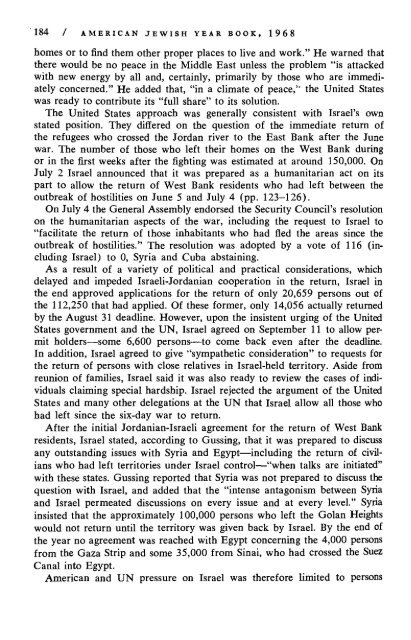1968_4_arabisraelwar
Create successful ePaper yourself
Turn your PDF publications into a flip-book with our unique Google optimized e-Paper software.
184 / AMERICAN JEWISH YEAR BOOK, <strong>1968</strong><br />
homes or to find them other proper places to live and work." He warned that<br />
there would be no peace in the Middle East unless the problem "is attacked<br />
with new energy by all and, certainly, primarily by those who are immediately<br />
concerned." He added that, "in a climate of peace," the United States<br />
was ready to contribute its "full share" to its solution.<br />
The United States approach was generally consistent with Israel's own<br />
stated position. They differed on the question of the immediate return of<br />
the refugees who crossed the Jordan river to the East Bank after the June<br />
war. The number of those who left their homes on the West Bank during<br />
or in the first weeks after the fighting was estimated at around 150,000. On<br />
July 2 Israel announced that it was prepared as a humanitarian act on its<br />
part to allow the return of West Bank residents who had left between the<br />
outbreak of hostilities on June 5 and July 4 (pp. 123-126).<br />
On July 4 the General Assembly endorsed the Security Council's resolution<br />
on the humanitarian aspects of the war, including the request to Israel to<br />
"facilitate the return of those inhabitants who had fled the areas since the<br />
outbreak of hostilities." The resolution was adopted by a vote of 116 (including<br />
Israel) to 0, Syria and Cuba abstaining.<br />
As a result of a variety of political and practical considerations, which<br />
delayed and impeded Israeli-Jordanian cooperation in the return, Israel in<br />
the end approved applications for the return of only 20,659 persons out of<br />
the 112,250 that had applied. Of these former, only 14,056 actually returned<br />
by the August 31 deadline. However, upon the insistent urging of the United<br />
States government and the UN, Israel agreed on September 11 to allow permit<br />
holders—some 6,600 persons—to come back even after the deadline.<br />
In addition, Israel agreed to give "sympathetic consideration" to requests for<br />
the return of persons with close relatives in Israel-held territory. Aside from<br />
reunion of families, Israel said it was also ready to review the cases of individuals<br />
claiming special hardship. Israel rejected the argument of the United<br />
States and many other delegations at the UN that Israel allow all those who<br />
had left since the six-day war to return.<br />
After the initial Jordanian-Israeli agreement for the return of West Bank<br />
residents, Israel stated, according to Gussing, that it was prepared to discuss<br />
any outstanding issues with Syria and Egypt—including the return of civilians<br />
who had left territories under Israel control—"when talks are initiated"<br />
with these states. Gussing reported that Syria was not prepared to discuss the<br />
question with Israel, and added that the "intense antagonism between Syria<br />
and Israel permeated discussions on every issue and at every level." Syria<br />
insisted that the approximately 100,000 persons who left the Golan Heights<br />
would not return until the territory was given back by Israel. By the end of<br />
the year no agreement was reached with Egypt concerning the 4,000 persons<br />
from the Gaza Strip and some 35,000 from Sinai, who had crossed the Suez<br />
Canal into Egypt.<br />
American and UN pressure on Israel was therefore limited to persons


